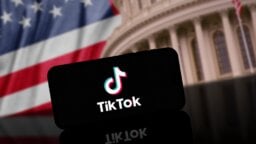TikTok and its parent company ByteDance filed an emergency motion today (December 9) for a temporary injunction to block a law that could effectively ban the app in the US on January 19.
On Friday (December 6), a federal appeals court in the US unanimously rejected TikTok’s lawsuit to challenge a law that could force it to cut ties with its China-headquartered parent company ByteDance or face a complete ban in the market.
A three-judge panel emphasized that the government’s main motivation is protecting American free speech from potential foreign interference.
TikTok asked the US Court of Appeals for the District of Columbia on Monday to delay the law from coming into effect until the US Supreme Court hears its appeal of Friday’s decision.
In Monday’s emergency motion, which you can read in full here, TikTok and ByteDance argue that “the Supreme Court should have an opportunity, as the only court with appellate jurisdiction over this action, to decide whether to review this exceptionally important case”.
The motion also argues that “an injunction is especially appropriate because it will give the incoming Administration time to determine its position — which could moot both the impending harms and the need for Supreme Court review”.
TikTok and ByteDance noted in their filing that the President-elect, Donald Trump, has promised to stop the app from being banned when he takes office.
“For all of those who want to save TikTok in America, vote for Trump”, the President-elect said in a video posted on his own social media platform, Truth Social, in early September.
According to TikTok’s filing on Monday, “the public interest in avoiding hasty judicial review is particularly strong here because the Act will take effect just one day before the inauguration of a new President”, which takes place on January 20.
The filing adds: “There is a reasonable possibility that the new Administration will pause enforcement of the Act or otherwise mitigate its most severe potential consequences.”
In its decision on Friday, the court highlighted how Chinese law requires companies “to cooperate with state-directed cybersecurity supervision and inspection.”
The judges cited what they called “compelling evidence that the Chinese government may use Chinese information technology firms as vectors of espionage and sabotage.”
The court acknowledged the significant impact on TikTok’s 170 million American users. However, it emphasized that the burden is attributable to the “PRC’s hybrid commercial threat to US national security.”
If TikTok fails to secure a buyer by January 19, 2025, the platform will effectively become unavailable in the US. TikTok’s parent company ByteDance has previously asserted that it has no plans to sell the platform.
In the 44-page emergency motion filed on Monday, TikTok argues that “an injunction will impose no material harm on the Government” and that “there is no imminent threat to national security”.
It continues: “That is particularly clear since (1) Congress itself delayed the Act’s effective date for 270 (and potentially 360) days; and (2) the Government’s own defense of the Act at most asserts that China “could” engage in certain harmful conduct through TikTok, not that China is currently doing so or will soon do so.
“A modest delay in enforcing the Act will simply create breathing room for the Supreme Court to conduct an orderly review and for the incoming Administration to evaluate this matter — before one of this country’s most important speech platforms is shuttered.”
In its statement published on its website on Monday, TikTok says that it is “at its core, its 170 million American users”.
TikTok claims that in 2023 alone, the advertising, marketing, and organic reach on TikTok contributed $24.2 billion, and TikTok’s own operations contributed an additional $8.5 billion to the US GDP.
TikTok cites “estimates [that] show that small businesses on TikTok would lose more than $1 billion in revenue and creators would suffer almost $300 million in lost earnings in just one month unless the TikTok Ban is halted”.Music Business Worldwide





